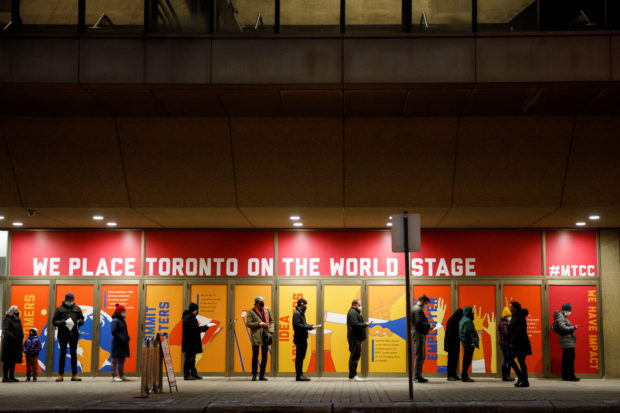
People queue up for their COVID-19 vaccine booster shots at a clinic inside the Metro Toronto Convention Centre, as the latest Omicron variant emerges as a threat, in Toronto, Ontario, Canada December 22, 2021. (REUTERS)
Canada’s health care system could withstand the impact from an anticipated rise in hospitalizations due to COVID-19 in the coming weeks, health officials said Friday, as signs emerge of a resurgence in infections in the country.
Canada is in a transition period and could still see “bumps along the way”, including a resurgence in cases this spring as well as later in the year, the officials said.
“While we could see some further increase in hospitalizations over the coming weeks, due to high population immunity from vaccination and recent infection, the impact on our health care system could be more manageable,” chief public health officer Theresa Tam said at a briefing.
Canada’s daily average case count increased 28% as of March 31, indicating a resurgence was on the way, Tam added.
The increase in COVID cases come just as authorities ease measures meant to curb the spread of the virus, emboldened by a brief drop in cases and relatively high vaccination rates.
Tam said the rise in cases, including in the two most populated provinces of Ontario and Quebec that have lifted restrictions, were not unexpected.
The highly transmissible BA.2 sub-variant of the Omicron coronavirus and waning immunity may have contributed to some increase in transmission, she said, adding that Canada was closely monitoring the sub-variant.
After more than a month of decline, COVID-19 cases started to increase around the world in March due to a combination of factors, including the BA.2 sub-variant and the lifting of public health and social measures, according to the World Health Organization.
United States, where BA.2 now accounts for more than half of all COVID-19 cases, authorized a second booster shot for Americans age 50 and older and those who are immunocompromised.
Canada’s National Advisory Committee on Immunization would soon be making a recommendation on a second booster dose, deputy chief public health officer Howard Njoo said Friday.